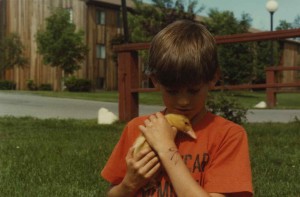When I was a child, there was a pond I loved. It lay a fifteen minute hike from the apartment complex where my family lived, over a hill and through some woods. It was in the middle of a meadow, fed by a natural stream. In it were tadpoles, a few species of frogs, crayfish, eastern painted turtles and snapping turtles, sunfish and catfish, perch and minnows, dragonfly larvae and salamanders, clams and snails, watercress, algae of several different varieties, and waterlilies. Butterflies of multiple species flitted around its shores, drinking water from the mud and nectar from the flowers nearby. Herons and egrets fished in its shallows. Mallards and black ducks raised their ducklings in the reedy shores, and some of their babies provided food for the snapping turtles—and occasionally a meal for a bullfrog or a crafty raccoon. And all the while iridescent dragonflies zipped around catching mosquitoes by the mouthful. It was a beautiful world, peaceful and private and pristine. I loved to catch turtles there—and just drink in the environment.
One summer day I hiked over to the pond and I discovered something that has remained seared in my memory: the pond was gone. In the intervening days since my last visit, it  had been bulldozed over. It, and the stream that fed it, no longer existed. All that was left of them was a large, brown dirt stain in the meadow and a set of bulldozer tracks leading in and out. The turtles and the fish and the crayfish and the salamanders and the frogs and the tadpoles were all buried under. Dead. Gone. Suffocated. There were no more butterflies, birds, or dragonflies either, but at least they had had a chance to escape, though I don’t know about the little ducklings.
had been bulldozed over. It, and the stream that fed it, no longer existed. All that was left of them was a large, brown dirt stain in the meadow and a set of bulldozer tracks leading in and out. The turtles and the fish and the crayfish and the salamanders and the frogs and the tadpoles were all buried under. Dead. Gone. Suffocated. There were no more butterflies, birds, or dragonflies either, but at least they had had a chance to escape, though I don’t know about the little ducklings.
I ran home and told my parents about it. It turned out that the pond, and the thirty or so acres of meadow around it, were owned by a local farmer who was getting up there in years. One day he had decided to sell the land and donate the money to his church. He sold it to the Wegmans corporation, who in turn converted what was left of the meadow into a giant supermarket complex: quality, affordable food and home supplies for the growing masses. It was all legal, and to the normal adults of my world, it was win-win. The town loved the cheap, abundant, locally available mostly non-local food and the extra jobs, the church loved the donation, and the old farmer loved the recognition from the church. And my parents: they probably felt a bit bad for me, but they didn’t do anything about it or have any good answers or options for me. And they liked shopping at Wegmans.
To me, this story is a microcosmic expression of everything I hate about our species’ unconsciousness: our unconscious disregard for nature, our unconscious free market economy, our unconscious swelling numbers, our unconscious religions, our unconscious use of technology, our unconscious parents’ messages to us about our own impotence to change anything, and ultimately, because of all this unconsciousness, our unsustainability on this planet.
